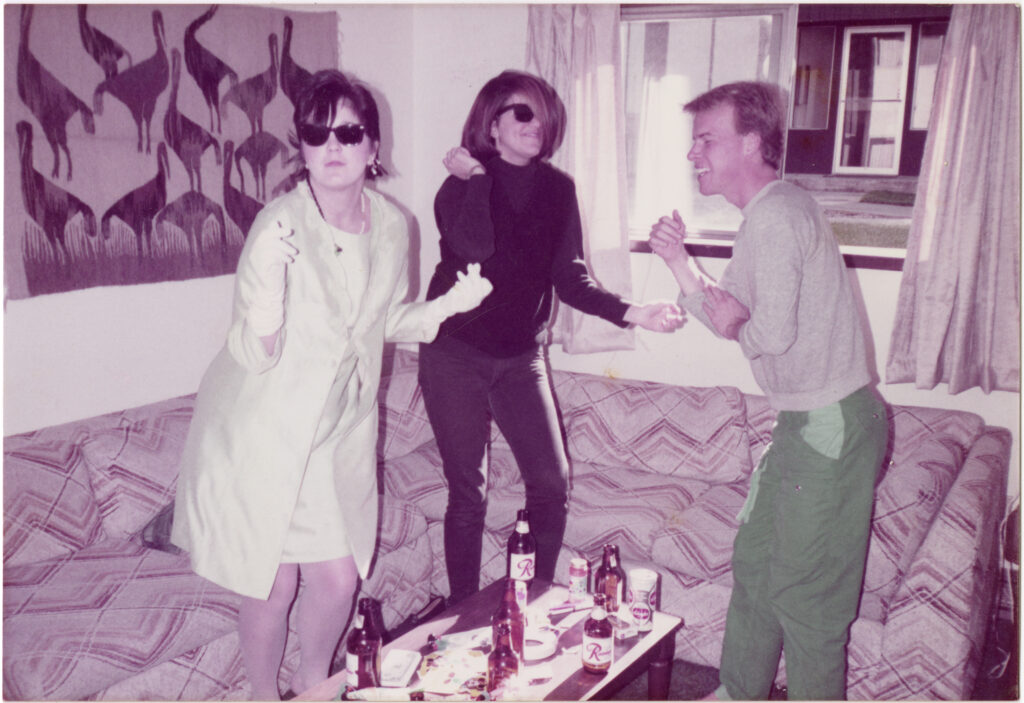There is a display case inside the library at Washington State University in Pullman with a collection of items that, if you didn’t know better, you might think are disconnected.
It includes a student ID card from the ‘80s. A lock of braided hair. Personal essays. A ball gag. A photograph of friends near a lakeshore. A handwritten recipe for apple pie.
There is also a painting of the Snake River, alongside a first-place blue ribbon from the Palouse Empire Fair, an unmistakable icon of rural life and living.

A display case shows some of the submissions for the Higher Ground Exhibit. (Credit: Rachel Sun / NWPB)
The items on display are all part of the “Higher Ground” exhibit that showcases queer art and ephemera from contemporary queer life and recent history in the Palouse region.
“I feel like a lot of times queerness is kind of rendered invisible in those spaces or assumed to be absent,” said Josie Cohen-Rodriguez, one of the exhibit’s curators. “I think this kind of just helps challenge those assumptions.”
The collection is part of a collaboration between Cohen-Rodriguez and June T. Sanders, a WSU assistant art professor. The two sought out artwork and memorabilia from queer community members and LGBTQ+ people who used to live in the area.
Sanders said one of the goals for the exhibit was to challenge ideas about what queer identity means, what it looks like, and where it can thrive.

(Credit: June T. Sanders)
“I think there was some trepidation from people saying, ‘Well, I don’t know what I would submit to this. I don’t know what sort of queer ephemera I have.’ We ended up having to have a lot of conversations saying, ‘Any ephemera that you have is queer ephemera,’” Sanders said.
The exhibit includes several pieces that capture small moments of daily life for LGBTQ+ people in the region.
“I think one of my favorite objects is a notebook from someone, it was the whole year that they lived here,” Sanders said. “It was really interesting to see diary entries about starting testosterone combined with ideas for art pieces, and then shopping lists, all combined into this one notebook. I think those little moments are important.”

Submissions for the Higher Ground exhibit at the WSU Manuscripts, Archives and Special Collections Gallery. (Credit: Rachel Sun / NWPB)
Cohen-Rodriguez said part of this project’s goal is to bring more contemporary queer representation to the WSU queer archive. Cohen-Rodriguez co-founded the queer archive at WSU two years ago as part of a project to identify LGBTQ+ materials within existing archival materials.
“I see community thriving here all of the time, but I didn’t see that in this institutional archive,” she said. “This is one of the ways that we’re trying to expand what that representation looks like.”
There isn’t just one representation of queer life in the exhibit. Cohen-Rodriguez said the submissions they chose purposefully show a wide range of experiences.

(Credit: June T. Sanders)
The exhibit is unconcerned with palatability, she said, and aims to challenge the way gender and sexuality are often policed within society.
“I think there’s this way that that queerness has been commodified,” Cohen-Rodriguez said. “We’re kind of told a palatable way of presenting queerness in a way that assimilates into the nation-state, and absolves itself of challenging institutional injustice.”
The items will be on display at the Manuscripts, Archives and Special Collections, or MASC Gallery, located in the Holland-Terrell Library at WSU, through queer history month in October. After that, they’ll be added to the WSU queer archives collection.
Sanders said she hopes visitors of the exhibit will take the time to connect the pieces to their own life.
“I do a lot of art things. I feel like with curators and galleries, they want you to just think about the conceptual nature of the art, but they don’t want you to think about how it relates to your life,” she said. “I think our combined superpower is getting people to think about how it all relates to their life and how they want to live it.”
Sanders said one contributor initially told her he didn’t have anything to submit because he wasn’t out during the time he lived in the area. However, those submissions also were included.
“I convinced him that that doesn’t matter. There’s still evidence of your existence in these photographs or in these objects that you’re donating,” she said. “I think that’s important for people to see. Even if you’re not out at that time, the actual imagery that you’re providing gives people a framework for their own existence.”
An opening reception for the “Higher Ground” exhibit is planned for 6 to 8 p.m. Friday, April 26 at the WSU MASC Gallery.
